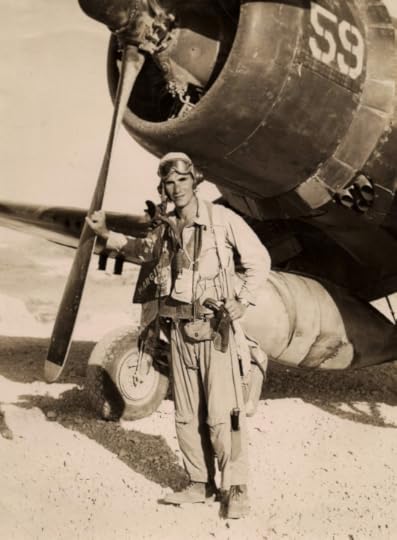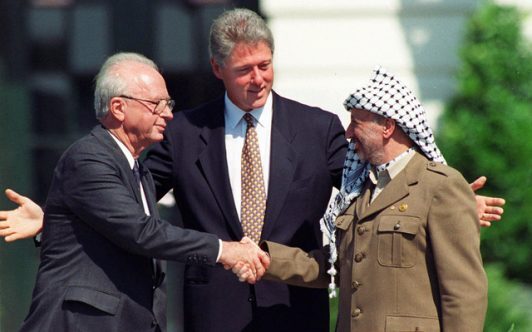“We Are Jews, We Cannot Commit Such Acts”
This is going to be a long post. I want to tell you a story from the 1948 Israeli War of Independence. It’s about a clash between my friend Lou Lenart and Yitzhak Rabin, who would go on to become prime minister of Israel and a great champion of peace—before he was assassinated by another Israeli on November 4, 1995.
 U.S. Marine captain Lou Lenart on Okinawa, 1945
U.S. Marine captain Lou Lenart on Okinawa, 1945First, a little about Lou. He was a Jew (he died a few years ago in Israel at age 93), born in Hungary in 1921; the family emigrated to the States when he was a boy. Lou enlisted in the Marine Corps at the start of WWII, eventually becoming a fighter pilot in the Pacific.
When Israel declared its independence on May 14, 1948, the country was immediately invaded by the armed forces of three Arab states—Egypt, Syria, and Jordan—whose intention was to destroy the Jewish state before it could be born.
Lou got himself to Israel, volunteering as a pilot. He led the four-plane mission (the Israel Air Force only had four planes, total, at the time) that stopped an armored Egyptian column eleven miles south of Tel Aviv, literally saving the infant state of Israel.
Not long after, Lou was made Operations Officer for the Israel Air Force. The IAF had upped its complement by then to about a dozen planes. Lou’s post was basically him, a driver, a radio, and a jeep. Rabin, a rising young captain, was the Operations Officer for the Army.
 Yitzhak Rabin, prime minister of Israel, 1974-77 and 1992-1995.
Yitzhak Rabin, prime minister of Israel, 1974-77 and 1992-1995.Fighting the Egyptian army in the Negev, the air force’s only bomber (with a crew of three) was shot down.
Here’s the story of what happened then, as Lou told it to me for my book, The Lion’s Gate. What follows is in Lou’s voice (my condensed version):
The ground fight was just starting. Days passed before we could assemble a force and search for the aircraft.
The plane had crashed on the shore alongside the Arab village of Ishdud. We went in with six or seven trucks and jeeps, lots of guns.
Yitzhak Rabin was ops officer for the army, as I said. I was the same for the air force. The wreckage of the plane was on the beach, burned to a cinder. Our guys rousted out the whole village, including the mukhtar, the mayor. We gathered them in the central square, with the trucks and guns around. A Haganah intelligence officer was interrogating the mukhtar in Arabic.
The plane had been on fire when it crashed, the mayor was saying. The villagers had tried to save the crew but the flames had kept them back. The Haganah officer asked what had happened to the bodies. The jackals got them, said the mukhtar. He and the villagers had tried to keep the beasts back but they couldn’t. The parts of the fliers’ flesh that hadn’t been burned in the crash were devoured by wild animals.
While the mukhtar was reciting this bullshit, my eyes were fixed on his left wrist. He was wearing the watch that had belonged to the pilot of the [bomber].
I got Rabin aside and told him to burn down the village. Put a bullet in the mukhtar’s head and drive all the villagers out. I pointed across the plain. The Egyptian lines are only a few hundred meters away. Let the villagers take their belongings and get out.
“I can’t do that,” said Rabin.
“Why not?”
“Lou, collective punishment is against the Geneva Convention.”
“The hell with the Geneva Convention! You think these Arabs are following the Geneva Convention? They burned our guys to death, then cut ’em up and fed ’em to their dogs—if they didn’t carve ’em up first while they were still alive!”
Already I was thinking that I would have to tell the fathers and mothers of these airmen what had happened to their sons. I would lie like hell, I knew that. I would never tell them the truth of how their sons had died.
I told Rabin again: Shoot the mukhtar and burn the village.
He refused. “We are Jews. We cannot commit such acts.”
Rabin was an idealist. The founding generations of Israel had suffered pogroms and persecution for so many centuries in Russia and Eastern Europe, not to mention the Holocaust only three years earlier, that it had become a point of honor with them that if they ever got their own country, they would not treat others with the same cruelty that they’d been treated with. You have to admire that. It’s honorable. It’s noble. But in war it’s bullshit.
“Would Alexander hesitate to burn this village? Would Caesar?”
“Would Stalin?” said Rabin. “Would Hitler?”
He put his hand on my shoulder.
“We cannot do it, Lou. If we take such actions, we abandon every principle we are fighting for.”
What could I say? Israel was Rabin’s country. I was a foreigner. I couldn’t force my way.
But if you ask me today whether I have any regrets in my life, I will say only one: that I didn’t shoot that mukhtar right then and there—and let Rabin and the Haganah do whatever they wanted with me.
Who was “right” in this case—Lou or Rabin? Whose point of view, if enacted across the board as policy, had the best chance of producing, over time, peace and harmony for both peoples?
Rabin’s position is clearly the most high-minded and moral. Would it have “worked,” in the sense of inspiring in the minds of Israel’s enemies the motivation to negotiate in good faith, seeking a political solution that was equitable for all? We’ll never know because Rabin’s championing of peace over the following nearly fifty years resulted in his assassination by forces within his own nation opposed to such a posture.
What about Lou’s point of view? Certainly, the actions he urged, assuming what he accused the mukhtar of was true, would have produced “justice.” But wouldn’t they, as Rabin stated, betray the ideals of the fledgling Jewish state… and in fact create such hatred among any Arab who learned of them that they would, over time, produce generations who would grow to embrace the ultra-barbaric terrorism we’ve seen from Hamas over the past few days?
Would Rabin’s open-handed policies have produced the same result for different reasons?
I don’t know. My own instinct is that neither point of view would have produced an outcome of peace, or even embittered co-existence, then or now. I put this story of 1948 forward mainly to provide a bit of historical context for the moral and political nightmare that Israel finds itself in today.
Is there some third solution? Is there some policy or course of action somewhere between Rabin’s reaching out and Lou’s Old Testament eye-for-an-eye vengeance?
The post “We Are Jews, We Cannot Commit Such Acts” first appeared on Steven Pressfield.


